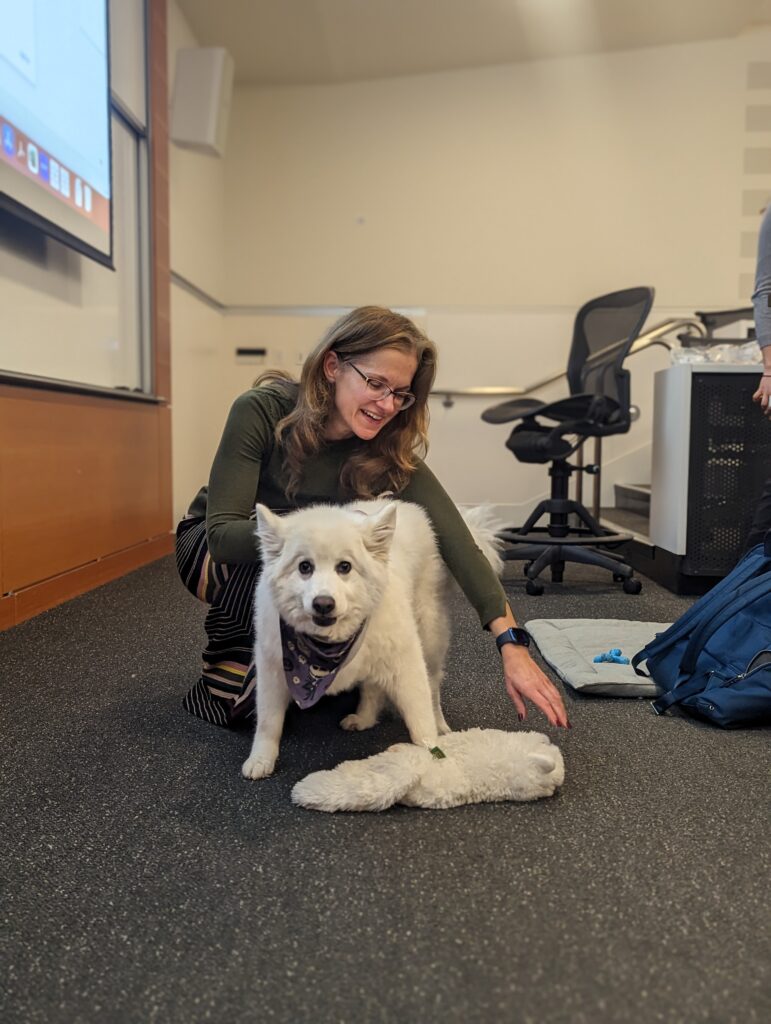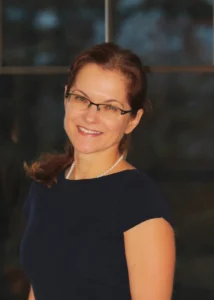Foster Operations Faculty Spotlight – Masha Shunko
Get to know Foster’s Associate Professor of Operations Management Masha Shunko, who teaches the core MBA course Operations and Supply Chain Management, as well as the elective courses Business Analytics – Tools for Big Data, and Sustainable Design of Global Supply Chains.
Please tell us a bit about your background.
I originate from the charming country of Estonia. Growing up, I spoke Russian and always assumed I had a Russian background until 23andme.com proved me wrong. It turns out I am a mix of Jewish, Latvian, and Estonian heritages. My hobbies include yoga — I am a certified yoga teacher, specializing in power vinyasa, and occasionally, I organize yoga retreats for women. I also enjoy hiking, especially if it culminates with a plunge into a mountain lake, cross-country skiing (considering Estonia’s tallest mountain is only 300 meters, downhill skiing wasn’t an option), paddleboarding (with some SUP yoga added), reading books, and discussing them with friends (recently, “Think Like a Monk” by Jay Shetty was my favorite). Additionally, I am involved in building a math museum. Check out our work in progress – Seattle Universal Math Museum. I have two lovely dogs, a Japanese Spitz and a Jindo/Corgi mix — you are likely to encounter them in the hallways at some point.

What are some of your research interests?
My research includes work in global supply chains management, studies of behavioral aspects of service systems, and operational excellence. A significant focus has been on enhancing operational efficiency in healthcare systems, such as determining optimal emergency departments for ambulance diversion to ensure timely patient care. Witnessing how operational improvements can positively impact both business and people’s lives fuels my passion for this field.
Which factors influenced your decision to join UW Foster?
After spending several years amid endless plains and cornfields at Purdue University in Indiana, I discovered Foster to be the perfect blend of an inspiring location, a progressive student population, and access to captivating companies and industry professionals.
Are you currently doing work outside of Foster that influences what happens in the classroom? How have your relationships with industry experts influenced what happens in your class?
I find it crucial to stay engaged with industry experts, either through consulting, through teaching executive programs, or through attending practitioners’ conferences. As an illustration, during my engagement with Microsoft, I collaborated with the team responsible for designing a digital twin solution for supply chains. Conversations with these technical experts, who developed AI solutions to streamline supply chain processes, furnished me with compelling content that I could relay to my students in my supply chain electives.
Recently, I had the privilege of attending a Digital Supply Chain Transformation conference in Austin, TX where I moderated panels and roundtables centered around sustainable and resilient supply chains. Numerous practical stories shared during the conference corroborate the principles I impart in my operations and supply chain courses. Examples include how Coca-Cola identifies by-product synergies, repurposing yeast waste from their processes by redirecting it to nearby bakeries, and how Conagra strategically formulates flexible recipes to navigate disruptions in the food supply chain, among other insightful instances.
Please tell us about the goal of your course – what can students expect to master by the end of it?
The goal of operations is to make things work better — whether it’s a manufacturing process, software development, job search, or the intricate art of raising a child. As the course unfolds, students develop the skills to critically assess operational and procedural choices, recognizing inefficiencies within processes, and innovating strategies for improvement. These skills are applicable anywhere and everywhere: in jobs, in life, in relationships, you name it!
Caution, though: After my course, you might find yourself unable to visit a restaurant without second-guessing its layout, server count, menu length, and more.

